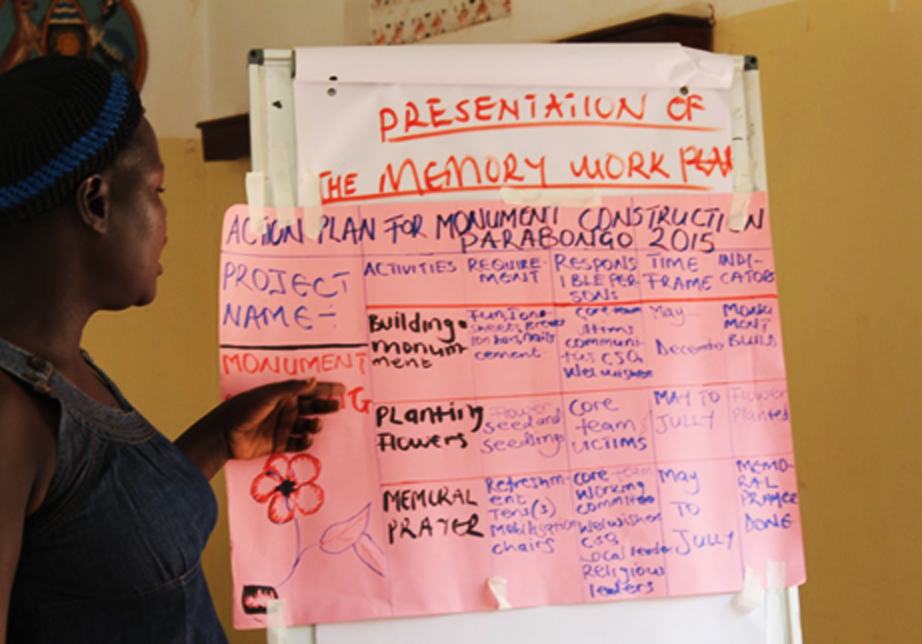
With funding support from USAID-SAFE Program, the Community Mobilization department at JRP conducted a series of trainings on themes of memory and reconciliation with 39 members of Community Reconciliation (CORE) teams in seven communities across Lango and Acholi sub-regions. Held in May, 2015, these trainings covered a range of topics including conflict mitigation, peace building, forgiveness and reconciliation, gender mainstreaming in peace building and reconciliation programs, trauma healing and counseling skills, and memory and memorialization. This helped the members of the CORE teams to understand the importance of memorialization and to envision an ideal memory and reconciliation project for their communities.
During the training, the participants examined the following questions in order to come up with an ideal memory project for each of the seven communities:
- What are the conflict events that occurred in your areas?
- What conflict event do you want to remember?
- How would you like to remember it?
- What memory projects would promote healing, advocacy and reconciliation for your communities?
- What ideal memory project can you implement in your community?
These guiding questions helped the CORE team members to come up with ideas for memory projects in consultation with their respective victims’ communities, which could be implemented within five months in their communities. The seven communities came up with the following innovative ideas for community memory projects which are now nearing successful completion.
Lukodi: The community of Lukodi chose to write a book which documents life before the war, and also emphasizes how culture has been eroded by war and makes suggestions on how it can be rejuvenated. They also chose to legally register the acquired piece of land which serves as the memorial site for the Lukodi massacre of 2004. This would enable the community to transfer a monument for the massacre which is in another area to this land and to develop the site.
Parabongo: The community of Parabongo, with guidance of the CORE team, chose to construct a new memorial stone to replace an older barely visible monument. They envisage having a more visible monument in memory of the people killed by LRA in Parabongo in 2006.
Atiak: Together with the CORE team, the victims’ community in Atiak chose to develop a list of conflict memorabilia to be preserved to document their memory of the war. They also decided to develop a profile of those who were killed in the 1995 massacre, and after verifying the list of names, they will engrave and place it onto a memorial monument. The community also pledged to facilitate a process of community-led documentation through the use of arts to preserve memories of events that became a turning point in the lives of the people of Atiak at the peak of the war.
Burcoro: The community of Burcoro chose to construct a monument in memory of the people killed during the military operation led by NRA in Burcoro in 1991. They wished to preserve memories of state-led atrocities that were never acknowledged.
Odek: The people of Odek also felt they were never publicly acknowledged to have suffered during the LRA war. To them, putting up a memorial monument would communicate what they went through in order for them to also be considered for post-conflict reconstruction services. They, therefore, chose to construct a memory stone in memory of the mass killing by LRA in Odek.
Barlonyo: The community of Barlonyo decided to beautify their memorial site in order to celebrate the lives of their loved ones who perished in the 2002 massacre. They chose to fence and beautify the memorial site with a variety of beautiful flowers blooming in gardens adjacent to well-paved walkways.
Abia: In Abia, the community chose to erect a monument in the form of a statue of a helpless woman which depicts their plight in the aftermath of the massacre of 2004. They also decided to make a painting on the wall of memorial school in memory of their war experiences.
JRP pledged to support the seven communities in the implementation of their respective community memory projects, which have been shaping well over the last five months. As the projects near completion, JRP is proud to reaffirm its support to showcase community-relevant approaches to justice, healing and reconciliation.


